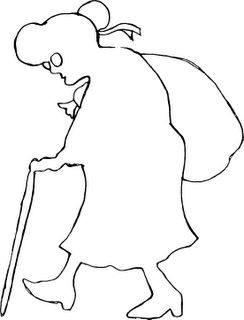This year it might even be justified, but strangely, I don’t feel like it. Most years, my list of “shoulds” has far outweighed my list for Santa. But then, I was raised to not believe in Santa, so my puny wish list is no sign of virtue. And I don’t want to display a list of completed shoulds as evidence of my virtues. Because, ouch.
This year, as usual, I’ve waited to observe Christmas until, well, Christmas. Today is but the first of twelve days of Christmas, so I’ve been quite happy to ignore all the frantic preparations of the commercial, non-Advent flavor, preferring gentle penitence to be followed by pleasant reflection upon the reason for the Christian version of winter revelries. (When I “do” Advent, that is.) That, actually, is one of the reasons I’ve taken perverse delight in echoing Scrooge anytime between Labor Day and Christmas Day.
The other reason is that I can’t plan my way out of a paper bag. “Bah, humbug” is camouflage for “I can’t deal with it!” I surrender (early and often) to my seemingly congenital lack of ability to prepare, and even get some smiles out of others, by uttering those three simple syllables.
But this year… this year I showed signs of preparation. Truly. I baked several batches of futzy, time-consuming Norwegian Christmas delicacies (hah!), with plans to make more. Maybe my evil twin freaked out and staged an intervention to prevent me from further exposing my hitherto-hidden lack of Scrooge-osity. My secret is out.
Or, it would have been, had I not gotten the flu. I left work Monday morning, suddenly aching from head to toe. The aching has subsided only today, and the fever broke sometime during the night.
This meant a) no more baking; b) no trip to Michigan for Christmas with hubby’s family; c) no church. Serious enough to warrant a “bah?”
But here’s the icing on the
My son is moving back to Chicago from southeastern Minnesota. His dad drove up to help him with the packing, but the weather up there right now is anything but helpful—full winter storm conditions, last I heard. Then his dad’s car developed a problem that must be fixed, and the soonest it can be fixed is Monday. Probably this would warrant a “humbug,” no?
So that makes this the first Christmas I haven’t shared with my son in 25 years and the first one my husband hasn’t shared with his daughters. However, it is also my first Christmas as Wife with New Husband, and he is gallantly assisting me through my illness and recovery.
I’m with my love (though also being with his family and my son would be preferred). All things considered, perhaps I can alter my seasonal muttering to “Merry Humbug!” Suddenly switching over completely would be just too shocking.


